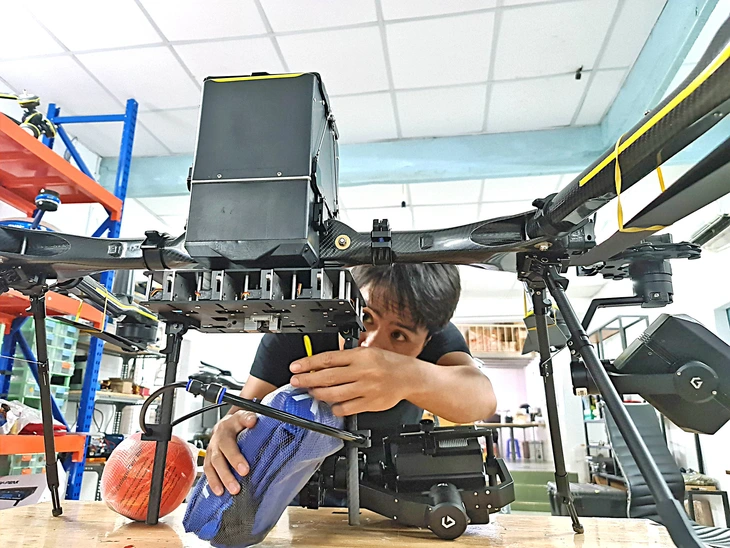Although considered an important driving force of the economy, private enterprises, especially small and medium enterprises, are facing many barriers from policies, administrative procedures, difficulties in capital, land, market and human resources...
 There needs to be a preferential mechanism for startups, small and micro businesses. In the photo: manufacturing drones at a startup in Ho Chi Minh City - Photo: N.HIEN
There needs to be a preferential mechanism for startups, small and micro businesses. In the photo: manufacturing drones at a startup in Ho Chi Minh City - Photo: N.HIEN
To create a real boost for the private economy, the business community recommends a "revolution" in policy and implementation, starting with shifting management thinking to development thinking, allowing businesses to do everything that is not prohibited by law.
The time to process procedures is 20 days but it takes a whole year
Recently, we have recorded more than 3,600 comments from member businesses, of which up to 1,400 comments pointed out that the institutions and administrative procedures are still cumbersome and inconsistent between sectors and levels, causing difficulties for businesses.
Specifically, businesses reflect many overlapping and inappropriate legal regulations, causing difficulties in application. The settlement of investment and land records is often delayed, affecting the progress of project implementation.
The situation of "hot above, cold below" and the "ask - give" mindset is still common at the local level and some businesses also believe that there is still discrimination between state-owned enterprises and private enterprises.
For example, some businesses are not qualified to rent land in industrial parks, so they have to rent land from people to build small warehouses (about 800 - 1,000m²). However, the fire prevention and fighting system still has to be invested synchronously with a cost of 800 million to 1 billion VND, far exceeding the value of the goods in stock.
Some businesses only import and export chemicals but still have to strictly comply with Decrees 113 and 82 on chemical management, with registration costs being too high and the requirement to rent warehouses for 2 years being a big burden.
In the land sector, some businesses reported that the red book issuance procedure should only take 3 days, but in reality it can take up to 3 months. Some education start-ups took 2 years to complete the legal procedures to request permission from the ministries and branches. If they want to expand to other localities, they have to request permission again from each province, so the question is: Is it necessary to request permission 34 times for 34 provinces and cities? Although there are reports of reducing the processing time from 30 days to 20 days, in reality, the documents can be delayed for a whole year.

Mr. Dang Hong Anh (Chairman of the Vietnam Young Entrepreneurs Association)
A common point that businesses all reported is that logistics costs in Vietnam are still high (16 - 17% of GDP), higher than the world average, reducing the competitiveness of goods. Meanwhile, inter-regional transport infrastructure, seaport - border gate connections are still weak.
Reduce pre-audit, increase post-audit
From the reality of difficulties and barriers, the business community wants a revolution in policy and implementation.
There needs to be a separate law to legalize the role of the private economy. It is necessary to simplify and make transparent administrative procedures, including shortening the time for processing records, applying online public services, and publicizing technical standards.
Promote digitization of procedures, reduce paperwork, and shorten time. Shift from "easy-to-manage institutions" to "easy-to-get-rich institutions", reduce pre-audit, increase post-audit.
In addition, it is necessary to abolish information disclosure and ban exit for small value tax debts. For small debts, tax authorities should prioritize reminder measures such as email and text messages. It is necessary to amend regulations in the direction of stipulating a large enough tax debt level to only ban exit in cases of real procrastination in tax payment.
In addition, tax authorities need to have a mechanism to classify between behaviors such as unintentional and erroneous. Strong measures such as public identification and exit ban should only be the last resort, reserved for procrastinators.
With tax and fee incentives for small businesses, businesses expect central agencies to study corporate income tax and business license fee exemption and reduction packages in the first years for newly established businesses, innovative businesses and businesses in disadvantaged areas.
At the same time, apply the principle of risk management in tax inspection and examination, avoid overlap and cause trouble for businesses that comply well. In particular, it is necessary to build and effectively operate funds to support innovation, digital transformation, and credit guarantee funds for small and medium enterprises.
Businesses also proposed the need to pilot a "Regional Policy Sandbox", allowing localities to test new mechanisms and policies in a controlled manner in areas such as logistics, OCOP export, innovation, finance, etc. before expanding.
The effective implementation of these proposals is expected to create a strong driving force for the development of the private economic sector, especially small and medium enterprises and startups, contributing to achieving national economic development goals.
"Breaking the ice" of credit barriers
Most small, micro and start-ups report difficulties in accessing bank credit due to high collateral requirements and complicated procedures. Long-term capital sources for science and technology, innovation and research and development projects are not diverse. Specialized capital mobilization channels such as venture capital funds, innovation support funds, or credit guarantee funds are still absent or ineffective.
Although the innovation index ranks Vietnam's "Domestic credit for the private sector" at a fairly good level (22/133), the survey shows that the problem is not the total amount of credit, but the ability of small businesses, start-ups and non-traditional assets such as cash flow or commercial contracts to access.
Therefore, businesses propose to establish a fund with 30-40% of the State's capital contributed along with private funds under an equal mechanism to invest in deep technology, green technology and digital agriculture. Specify policies to allow deduction of R&D costs, tax exemption for domestically registered patents, and issue a 15-day fast tax refund mechanism for qualified enterprises...
Proposing the "100 Going Global Industrial Parks" program
To create strategic spearheads and help enterprises reach international standards, enterprises proposed the "100 Going Global Industrial Parks" program. In this program, the State will focus on supporting hard infrastructure and technology such as industrial 5G telecommunications, traceability platforms, site clearance, and ensuring stable electricity and water.
The State will also cooperate under the PPP model to build dry ports and logistics centers, while offering incentives on infrastructure fees for green vehicles and granting domestic carbon credits. The private sector will take on the "software" of governance, people, and culture.
According to Tuoi Tre Newspaper (Author Dang Hong Anh - Ngoc Hien)